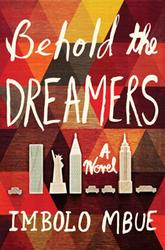
|
|
| photo: Kiriko Sano | |
Imbolo Mbue is a native of Limbe, Cameroon, and holds a B.S. from Rutgers University and an M.A. from Columbia University. She's been a resident of the United States almost 20 years, and now lives in New York City. Behold the Dreamers (Random House), the story of a young Cameroonian family in New York, is her first novel. Our review is below.
What do you think the American dream means today, and do you think it's still a relevant concept?
I think the concept of the American Dream is still relevant because despite its flaws, America is a land of opportunities. All around us there are stories about immigrants who arrived here with very little and established a better life for themselves, a kind of life which was near impossible in their homelands.
That said, I question the accessibility of the American Dream. I don't believe the playing field is level and, as you can see in the Jongas' story, it is a long, arduous journey for many people--immigrants and citizens alike--to move out of poverty and live their dream lives in this country. And even when one is supposedly living the dream, like the Edwardses, it requires a lot of sacrifice to hold onto it. I think this is because the American Dream today is very much about material comforts and outwards symbols of success--a good job, a nice house, a nice car, fashionable clothes and accessories, yearly vacations, the latest technology--but striving for all this comes at a price and I believe that this novel, among many things, is about the prices we pay to see our dreams come true.
How much of Behold the Dreamers is drawn from your own experiences as an immigrant?
Like the Jongas, I am an immigrant from Limbe, Cameroon. And like them, I also lived in Harlem, and I've certainly had my share of poverty. I believe in the value of hard work and determination, like them, something I've found to be a common trait among immigrants. That, however, is where much of our similarities end--most of their story, and their experiences as immigrants, was based on stories told to me by other immigrants.
How did you research other immigrants' experiences?
Over the course of my time in America--I arrived in 1998--I've had opportunities to talk about life as an immigrant with dozens of my fellow immigrants. Some of them were friends, others were complete strangers I met in public places like bus stops and parks. Of course, at the times of these conversations I had no idea the seeds for this novel were being planted in me. It was only when I sat down to write that I realized that the story I was writing reflected numerous immigrant stories I'd been told over the years. You add such depth to each character. To me, Neni is the heart of the story. What about you?
You add such depth to each character. To me, Neni is the heart of the story. What about you?
Thank you. I can completely understand why you think Neni is the heart of the story--she has agency and recognizes that merely being in America is an opportunity and thus she is determined to make the best of that opportunity.
For me, all four main characters--Jende, Neni, Clark and Cindy--are the heart of the story. I feel for each of them, and even though their choices and actions are sometimes not the wisest, I empathize with them because so often in life we do what we think is best in the moment, forgetting that there might be consequences down the road.
Neni considers extreme measures to keep her young son in the States when she may be unable to remain. Why does keeping him here feel so essential to her?
She thinks it's essential because like millions of parents all over the world, she wants her child to have the life she never had. Neni is a big believer in the American Dream, and even when obstacles stand in the way of her becoming a successful pharmacist with a house in the suburbs, she continues striving, because she believes her dreams will come true. And when it appears these dreams might not come true, she thinks about what she can do so that if she can't have a dream life, at least her child can. It might seem shocking what she considered, but I've heard stories of mothers who made even tougher choices so their child could live in America--for example, Central American mothers who've paid coyotes to cross the U.S.-Mexico border with their child even though they knew of the dangers involved in such a crossing.
Why did you choose to set the story during the Great Recession?
Well, at the time I got the inspiration to write the story, the effects of the Great Recession were still very fresh in New York City and thus I was interested in exploring how the recession had affected the lives of New Yorkers from different backgrounds. The story starts in the fall of 2007 when the country seemed pretty stable and we were watching the rise of Barack Obama, which I thought was apt, considering that both the Obamas and the Jongas were dreamers--different kinds of dreamers, but still dreamers.
The timeframe also allowed me to present the Great Recession from Jende and Neni's perspective, and being that Clark Edwards is employed at Lehman Brothers, it also allowed me to imagine what it might have been like for employees at Lehman Brothers in the days surrounding the collapse of the bank.
How did you develop a vision for the characteristics and lifestyle of the Clark family?
Thanks to having lived in New York City for many years, I've had opportunities to meet people who share similar characteristics with the Edwards. I can't say I've spent as much time around the likes of the Edwardses as I have around the likes of the Jongas, but the interactions I had with them (in addition to stories told to me by friends who have friends from such backgrounds, as well as stories I heard from people who work for them) allowed me to piece together their lifestyle and develop their characters.
What can we expect to see from you next?
Thank you for already looking forward! Writing Behold the Dreamers was a long, complex experience, so for now, I'm simply enjoying talking about it. --Jacki Fulwood

